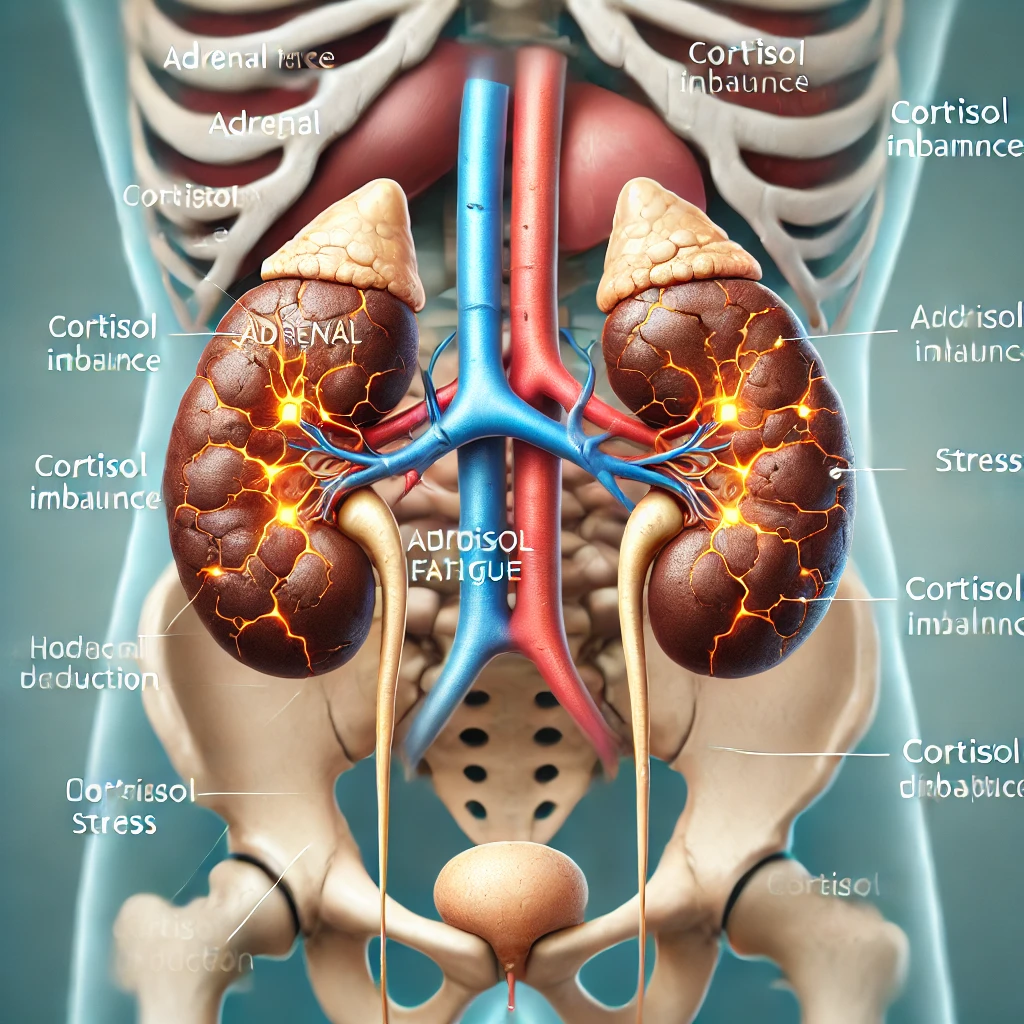
Introduction
Adrenal fatigue is a condition often associated with chronic stress and overwork, leading to the malfunctioning of the adrenal glands. The adrenal glands are responsible for producing essential hormones, including cortisol, adrenaline, and aldosterone, that help regulate various bodily functions.
When the adrenal glands become depleted or overstimulated due to prolonged stress, it is thought that they may struggle to produce adequate levels of these hormones. Although adrenal fatigue is not officially recognized as a medical diagnosis, many people report symptoms such as fatigue, weakness, and difficulty managing stress.
What is Adrenal Fatigue?
Adrenal fatigue occurs when the adrenal glands become overworked, typically in response to chronic stress. Over time, the body’s fight-or-flight response becomes disrupted, and cortisol levels may fluctuate or decline, leading to a host of physical and mental health issues.
Adrenal fatigue is often linked to chronic conditions such as anxiety, insomnia, or poor dietary habits.
Symptoms of Adrenal Fatigue
The most common symptoms of adrenal fatigue include:
- Chronic Fatigue:
- Unrelenting tiredness that doesn’t improve with sleep.
- Difficulty Waking Up:
- Struggling to get out of bed in the morning, even after a full night’s sleep.
- Weakness:
- General feeling of weakness or inability to perform physical tasks.
- Sugar and Salt Cravings:
- A strong desire for sugary or salty foods.
- Mood Swings:
- Irritability, anxiety, or depression.
- Increased Sensitivity to Stress:
- Difficulty handling stressors, both big and small.
- Sleep Disturbances:
- Insomnia, trouble staying asleep, or waking up too early.
- Reduced Immune Function:
- Increased susceptibility to colds, infections, or other illnesses.
Causes and Risk Factors
Adrenal fatigue is primarily caused by chronic physical or emotional stress. Some of the common causes include:
- Chronic Stress:
- Prolonged periods of stress (work, relationships, financial issues) may cause the adrenal glands to become overstressed, affecting their ability to produce cortisol and other hormones.
- Poor Diet:
- Diets high in sugar, processed foods, and caffeine can contribute to imbalanced cortisol levels and adrenal fatigue.
- Lack of Sleep:
- Inadequate sleep or poor-quality sleep can disrupt the body’s natural circadian rhythm, putting further stress on the adrenal glands.
- Physical Overexertion:
- Intense physical activity, such as excessive exercise or overtraining, can deplete the adrenal glands.
- Chronic Illness or Infections:
- Persistent illness, infections, or autoimmune diseases can place additional strain on the adrenal glands, leading to their dysfunction.
- Emotional Trauma:
- Traumatic events or unresolved emotional stress can trigger prolonged cortisol release, leading to burnout.
Diagnosis of Adrenal Fatigue
Adrenal fatigue is not a formally recognized medical condition, so it may be challenging to diagnose. However, if adrenal fatigue is suspected, healthcare professionals may assess the following:
- Patient History:
- A detailed medical history to identify risk factors, including chronic stress, sleep disturbances, or other related symptoms.
- Hormone Testing:
- Salivary cortisol tests or blood tests to measure cortisol levels at various times of the day.
- Physical Exam:
- An exam to rule out other medical conditions that could be causing similar symptoms.
Treatment for Adrenal Fatigue
The primary treatment for adrenal fatigue involves lifestyle changes, dietary adjustments, and stress management techniques.
1. Stress Management:
- Relaxation Techniques: Practice relaxation exercises such as deep breathing, meditation, or yoga to reduce stress levels.
- Mindfulness: Engage in mindfulness or cognitive behavioral therapy (CBT) to manage emotional stress.
2. Improving Sleep Quality:
- Aim for 7-9 hours of sleep per night.
- Create a calming nighttime routine to improve sleep quality and duration.
3. Dietary Changes:
- Balanced Diet: Focus on a nutrient-dense diet that includes whole foods like fruits, vegetables, lean proteins, and healthy fats.
- Adrenal-Supportive Foods: Include foods rich in vitamins B and C, magnesium, and adaptogenic herbs like ashwagandha and holy basil.
- Reduce Caffeine and Sugar: Limit caffeine intake and reduce processed sugars, which can cause cortisol imbalances.
4. Physical Activity:
- Moderate Exercise: Avoid over-exercising, and focus on moderate activities such as walking, swimming, or light yoga.
5. Herbal and Nutritional Supplements:
- Adaptogenic herbs like rhodiola, ginseng, and holy basil may help support adrenal function.
- Nutritional supplements like vitamin C, B vitamins, and magnesium can help improve adrenal health.
Prevention of Adrenal Fatigue
Adrenal fatigue can be prevented or minimized by:
- Maintaining a Healthy Work-Life Balance:
- Ensure regular breaks from work and avoid overcommitting to tasks.
- Practicing Healthy Lifestyle Habits:
- Follow a balanced diet, exercise regularly, and get adequate rest.
- Managing Stress:
- Regularly engage in stress-reducing activities such as mindfulness, hobbies, or relaxation techniques.
- Seeking Professional Help:
- If you feel constantly fatigued or overwhelmed, seek professional help for stress management and overall mental well-being.
Frequently Asked Questions (FAQ)
Q: Is adrenal fatigue a real medical condition?
A: While adrenal fatigue is not officially recognized as a medical condition, it is a term used by many to describe symptoms of chronic stress and hormone imbalance.
Q: How long does it take to recover from adrenal fatigue?
A: Recovery from adrenal fatigue depends on individual factors such as stress level, lifestyle changes, and adherence to treatment. It may take several months to see significant improvements.
Q: Can adrenal fatigue cause weight gain?
A: Yes, adrenal fatigue can lead to weight gain due to hormonal imbalances, including elevated cortisol levels, which can increase appetite and fat storage.
Q: Are there medications for adrenal fatigue?
A: There are no specific medications for adrenal fatigue. Treatment typically focuses on lifestyle changes, stress management, and dietary support.
Takeaway
Adrenal fatigue is a condition believed to arise from chronic stress and overwork, leading to hormone imbalances, particularly involving cortisol. By focusing on stress management, improving sleep quality, and making dietary adjustments, it is possible to manage or recover from adrenal fatigue.
If you’re experiencing symptoms like chronic fatigue, mood swings, and difficulty handling stress, consult a healthcare provider to develop a treatment plan that works for you.
Leave a Reply